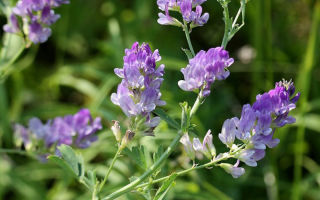Content
- 1 What does alfalfa look like and where does it grow?
- 2 Alfalfa species
- 3 Alfalfa chemical composition
- 4 What helps and how is alfalfa useful for humans
- 5 How to take alfalfa and cooking methods
- 6 The use of alfalfa in traditional medicine
- 7 Application in cosmetology
- 8 Cooking applications
- 9 Benefits of alfalfa for soil
- 10 Contraindications to the use of alfalfa
- 11 Collection and procurement
- 12 Conclusion
- 13 Reviews of doctors about the beneficial properties of alfalfa for humans
The beneficial properties of alfalfa for humans, first of all, relate to immunity and the vascular system. Since ancient times, it has been used for medicinal purposes in the Caucasus, China and Persia. Today, alfalfa is used as a valuable component of dietary supplements.
What does alfalfa look like and where does it grow?
Alfalfa is a fodder plant belonging to the legume family. It is also popularly called medunka or burkunchik. Alfalfa belongs to the category of polycarpic plants. It is distinguished by multiple fruiting and flowering. The plant has a strong root system and branchy stems, which gives it excellent resistance. It can reach a height of 1.5 m. The color of the petals changes, depending on the variety. It comes in white, purple, yellow, or blue. The fruits are brown beans.
Medunka grows on all continents in temperate climates. It got its distribution in Media, and later appeared in Greece. The plant was originally grown as horse feed. That is why it was called "Mead food". Most often, alfalfa is found on forest edges, on the shores of lakes and rivers. On the territory of Russia, it appears everywhere. A photo of the alfalfa plant can be seen below:
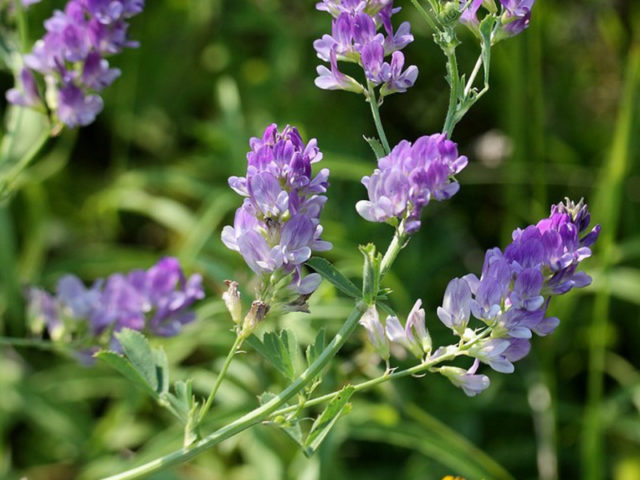
Alfalfa species
In nature, there are more than 100 plant species. There are both wild and cultivated types of alfalfa. Not all varieties are used for medical purposes. The most common types of sowing alfalfa include sickle-shaped (yellow), blue, hop-shaped, hybrid, and the Fairy variety.
Alfalfa chemical composition
Alfalfa contains many vitamins and minerals. Inflorescences and young plant sprouts are distinguished by the greatest number of useful properties. They are used not only for medicinal purposes, but also for food. The composition of the plant is represented by the following components:
- alimentary fiber;
- amino acids;
- flavonoids;
- saponins;
- anthocyanins;
- vitamins of groups PP, B, A, C, K and E;
- macro- and microelements (iron, zinc, copper, phosphorus, calcium, magnesium, selenium, copper, sodium, potassium);
- chlorophyll;
- essential oils;
- phytoestrogens;
- fatty acid;
- ketones;
- alkaloids.
Due to the content of alkaloids, the plant has a slight sedative effect. This allows it to be used for sleep disturbances and nervous disorders.Anthocyanins have antibacterial properties, and saponins regulate nerve-impulse transmission from the central nervous system to the muscles.
Ketones transport oxygen and nutrients to cells. Due to dietary fiber, the plant has the property of normalizing the functioning of the gastrointestinal tract. Due to the content of phytoestrogens, it is used in the treatment of gynecological diseases. Chlorophyll in the plant strengthens blood vessels, thereby improving blood circulation.
What helps and how is alfalfa useful for humans
Alfalfa is widely used in alternative medicine. It is often used as a powerful haemostatic and antioxidant agent. The plant can also be used as part of complex therapy. In addition, it effectively lowers cholesterol and boosts immunity. Indications for the use of alfalfa:
- tuberculosis;
- arthritis and gout;
- colds;
- drops in blood pressure;
- immunodeficiency;
- recovery after surgery;
- fungal infections;
- skin damage;
- diseases of the genitourinary system;
- indigestion;
- toxic poisoning.
Among the beneficial properties of alfalfa, the ability to cleanse the body of toxins and toxins is distinguished. Therefore, it is often used for early recovery from illness or surgery. In addition, a useful plant effectively copes with parasitic diseases and their complications.
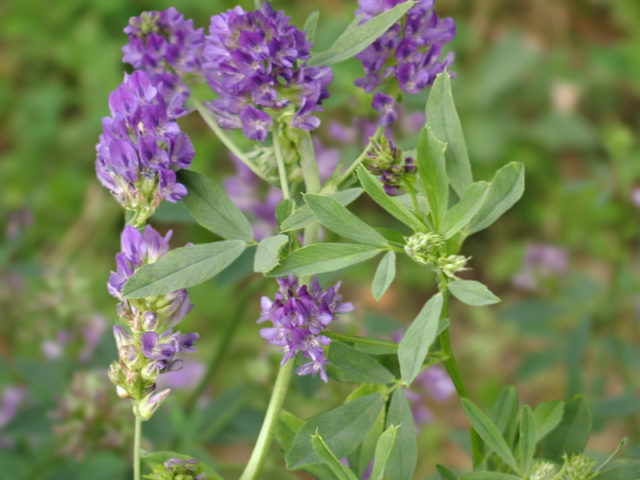
Benefits of alfalfa for women
The medicinal plant is considered to be especially beneficial for the female body. It contains polyunsaturated acids and phytoestrogens, which have a positive effect on the functioning of the reproductive system. The plant is able to cope with erosion and colpitis. It is often used for cosmetic purposes as well. Alfalfa perfectly eliminates acne and furunculosis.
During pregnancy, the plant saturates the body with calcareous substances, which are necessary for the growth of the bones and teeth of the child. During lactation, alfalfa stimulates the production of breast milk. During menopause, women use it to normalize hormonal levels and eliminate characteristic symptoms.
Useful properties of alfalfa for men
The medicinal plant can be included in dietary supplements designed to promote male health. It directs its action against prostatitis and impotence. The plant has anti-edema and anti-inflammatory properties. However, it is considered the most effective in the early stages of the development of the disease. In more advanced cases, drug therapy is used.
The healing properties of alfalfa for children
Children are given a decoction of honeycomb to increase immunity and strengthen bone strength. For this, 1 tsp is enough. useful plant per day. The desired effect is achieved by replenishing the vitamin and mineral reserves. Before using a remedy, it is advisable to consult a pediatrician.
How to take alfalfa and cooking methods
Alternative medicine uses alfalfa seeds, sprouts, root and juice. Each form of a remedy has a specific regimen and indications. For the medicine to be effective, you must follow the rules and recipes for its preparation.
Tincture
Alcohol tincture is often used in the treatment of joint diseases. It is used for rubbing and making compresses. Internal reception of the tincture is indicated for insomnia and nervous tension.
Components:
- 1 tbsp. l. honeycomb powder;
- 500 ml of vodka.
Recipe:
- Raw materials are poured into a dark glass bottle and poured with vodka.
- For 2 weeks, the medicine is infused in a dark place. Shake the container once every 2-3 days.
- Filter the product before use.
- Reception is carried out in 10 drops half an hour before meals.
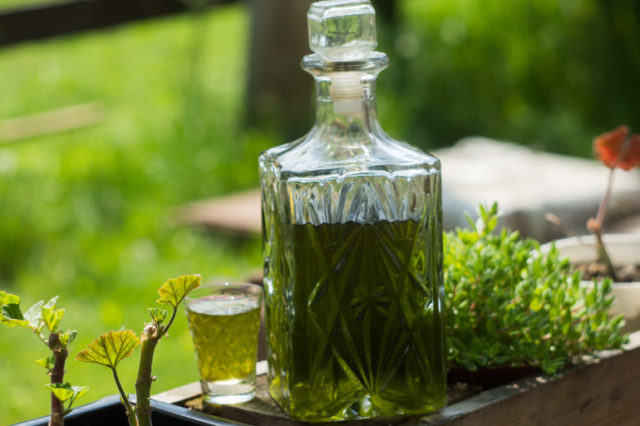
Tea
Alfalfa tea is recommended to drink to boost immunity and as a rejuvenating effect. It has invigorating and tonic properties. In addition, the tea is an excellent thirst quencher and has a pleasant taste.
Ingredients:
- 2 tbsp. l. alfalfa;
- 500 ml of water.
Cooking steps:
- Raw materials are poured into a kettle and poured with boiling water.
- The container is closed with a lid and left for 15 minutes.
- After infusion, the drink is poured into cups. If you wish, you can add honey to it.
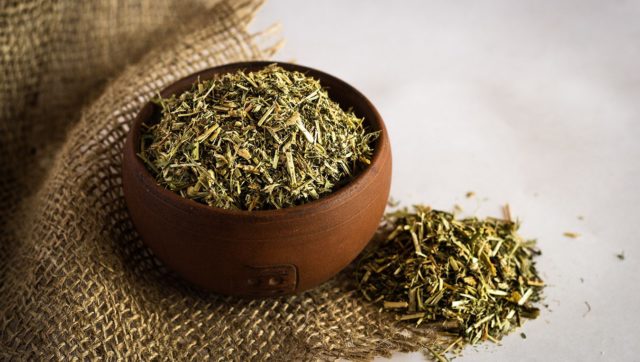
Decoction
The herbal decoction has a whole range of useful properties. It replenishes the supply of vitamins and minerals, thereby strengthening the immune system. At the same time, the pressure is stabilized and the digestion process is normalized.
Components:
- 100 g of alfalfa;
- 500 ml of water.
Cooking process:
- The dried plant is poured with water and put on fire.
- After boiling, keep the remedy over low heat for 10 minutes.
- After removing from the stove, the broth is cooled and then filtered.
- Reception is carried out in 80-100 ml 3 times a day.

The use of alfalfa in traditional medicine
The benefits and harms of alfalfa for the body are often discussed by supporters of alternative treatments. According to statistics, the plant has much more useful qualities than negative ones. Due to the abundance of beneficial properties, it helps to cope with a mass of diseases and prevent their development.
How to take alfalfa for diabetes
The medicinal properties of alfalfa make it effective against diabetes. It is renowned for its ability to regulate blood glucose levels. For diabetes mellitus, a herbal decoction is used. A single dosage is 60 ml. Reception is carried out 2-3 times a day. Useful broth should be drunk in small sips cooled.
For joint and muscle pain
To relieve pain in the muscles and joints, take alcohol tincture. A single dosage is 10 drops. Before taking the product, dilute with water. The tincture should be drunk 20-30 minutes before meals. Additionally, sore spots must be wiped with tincture 1 time per day.
With hemorrhoids
Alfalfa also heals hemorrhoids. In this case, use a herbal decoction. It is added during baths. The procedure allows you to reduce the intensity of pain and stop inflammation. Treatment is carried out until the symptoms disappear completely.
Alfalfa for lowering cholesterol
The main benefit of alfalfa sprouts is to lower bad cholesterol levels. This allows you to prevent the development of atherosclerosis by destroying cholesterol plaques. Juice must be prepared from the sprouts. It is taken in 2 tbsp. l. 3 times a day.
For skin diseases
Among the beneficial properties of sprouted alfalfa, the ability to accelerate tissue regeneration and eliminate the focus of inflammation is distinguished. That is why the plant is used to treat skin diseases. The broth is taken orally in 2 tbsp. l. and applied to the affected areas pointwise.
Alfalfa for anemia
Anemia develops when there is a lack of hemoglobin in the blood. To restore its supply, take a decoction of honey. To prepare a drink, take 1 tsp. horsetail, green nettle and alfalfa sprouts. The beneficial properties are revealed when the herbal mixture is infused for 5 minutes.The finished medicine is taken in 100 ml 1 time per day. After a week of taking the remedy, the patient's condition stabilizes.
Application in cosmetology
The beneficial properties of alfalfa root include the ability to rejuvenate the skin. It is suitable for all skin types. Before use, the root part is dried and ground to a powder state. Caring masks are made from the ready-made mixture. In addition to the main component, oils and herbal decoctions are added to them. Such masks are used to eliminate the first signs of aging and smooth out the skin's relief.
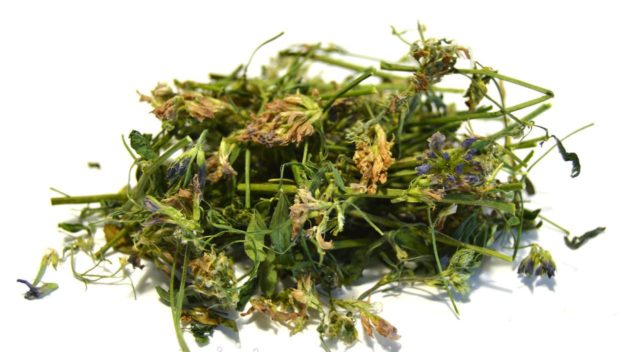
Ice cubes are made from the vegetable broth, which are used to wipe the skin. They prevent the appearance of the first age-related changes. The herbal decoction has a positive effect on the condition of the hair. It is used as a mouthwash after the wrinkle procedure. This helps to get rid of dandruff and normalize sebum production. Massaging the composition into the scalp helps prevent hair loss.
Cooking applications
Due to its pronounced benefits, alfalfa microgreens are also in demand in cooking. The leafy part of the plant is used for making salads and soups. Sprouts are considered especially useful. They are often used to make burrito fillings. They also go well with meat and vegetables. They make excellent cutlets and casseroles.
The use of alfalfa seeds is common in baked goods. They are ground to a powder and mixed with flour. The sap of the plant is used to make vitamin cocktails. It is mixed with water and other drinks.
Benefits of alfalfa for soil
The benefits of alfalfa to humans lies in the fact that it can be used as a green manure. This term refers to plants that are grown specifically to fertilize the soil. Green manures saturate it with minerals and nitrogen, and also prevent the growth of weeds. The functions of alfalfa will vary depending on the type of soil. The plant loosens the clay soil, and strengthens the sandy soil. Sometimes a medicinal plant is used to prepare a liquid fertilizer. It fights soil acidification and saturates it with phosphorus.
Contraindications to the use of alfalfa
In addition to medicinal properties, alfalfa herb has contraindications. These include:
- individual intolerance;
- lupus erythematosus;
- exacerbation of chronic gastrointestinal diseases;
- pregnancy.
It should be remembered that the medicinal plant cannot be used in conjunction with immunosuppressants and oral contraceptives. It reduces their effectiveness. Excessive use of the herb can provoke an imbalance in the amino acid balance in the body. This contributes to the development of symptoms of toxic poisoning. To eliminate them, appropriate therapy is carried out.
Collection and procurement
The collection of the medicinal plant by mowing is carried out during the flowering period. This happens 50-60 days after sowing. After harvesting, honeycomb is placed in compost or used as animal feed. You need to cut off no more than half of the bush. This is necessary to prevent his death.
The plant is dried for use as a therapeutic agent. It is laid out on a flat surface in a room with good air ventilation and protected from direct light. You can also form bundles from the plant and hang them in an upright position. Dried raw materials should be stored in linen bags, providing protection from moisture and sunlight. You can also place the alfalfa in a glass container. For ease of storage and use, it is ground to a powdery state. If all conditions are met, alfalfa retains its benefits throughout the year.
Conclusion
The beneficial properties of alfalfa for humans are beyond doubt. The plant contains a huge amount of nutrients that have a beneficial effect on health. But to stop possible side effects, it must be used with caution.

